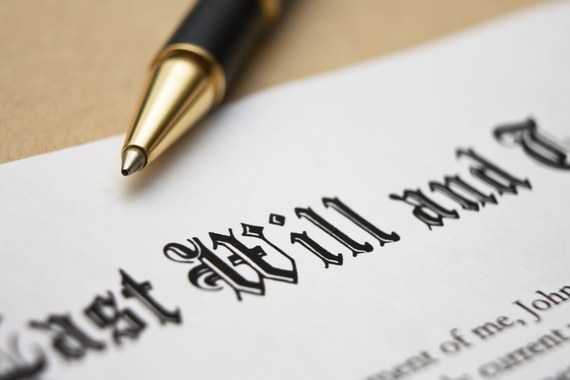I can't overstate the importance of updating your will during divorce. Since divorce can take years to process, your life feels like it's in a constant state of transition. Untying knots requires tying up loose ends. One of those is your will.
You certainly don't want your STBX acting as your next of kin. He's no longer the guy that gets "the call" should something unforeseen occur. He no longer decides if and when to pull the plug. That's a good thing. However, if you haven't taken the time to update your will including renaming your power of attorney, you leave yourself open to risk. Risk of having the plug pulled ahead of schedule, the risk of your ex inheriting upon your death, your RRSP or your 401K not to mention your valuables, personal effects and life insurance. Scary thought!
Let's not tempt fate, shall we?
Three reasons to update your will during divorce:
1) Avoid your ex or STBX inheriting your assets;
2) appoint a person to take care of things if you're incapacitated (power of attorney) and ensure your dying wishes are taken care of (executor);
3) make things easier for your heirs.
Book an appointment with a probate lawyer to update your documents and properly reflect your current situation should anything happen. Expect to spend around $500-$700. If you already have a divorce lawyer on retainer you could ask them. There are also online packages for do it yourself wills. I hear they are reliable, cheap and convenient.
It's worth checking out your local probate laws because they vary in each province and state. For example, in some states a written update with your signature is sufficient in court. That said, why leave it for your heirs to take to court? Make it official with a legal seal then there will be no challenges or questions.
Probate Law: Probate is the process by which the courts distribute a decedent's assets and property, under the direction of a will.
Death is a fact of life, so why not talk about it and prepare for it. You want to have your "ducks in a row" especially during a volatile time such as divorce. You have enough to think about without adding this to the list but believe me, you will feel much better once it's dealt with. All it takes is one or two appointments with the lawyer. While we dread the thought of it, actually dealing with our will is relatively painless.
I recommend deciding some things BEFORE the appointment. Rather than sitting there tongue-tied (like I was) when the lawyer asks for details, you can have your answers prepared ahead of time. For example, who will be your executor? This is a biggie because this is the person who takes care of everything upon your death. They make sure your dying wishes are in fact, reality. When you were married it was likely your husband but now, who should you ask? Someone your age or younger is recommended. A sibling is a good choice. If you don't have a sibling then your best friend is also good. An aunt or uncle might be a good choice if they're in good health. It should be someone you trust 100 percent.
After the executor is decided then the next big question, who gets your money and assets? If you have children they will automatically inherit. Consider at what age you want them to attain said assets and money. If they're underage right now then do you want them to access everything at age 18, 21 or in installments until they're 30? These are some of the choices you will stipulate in your will.
Lastly, the question of whether you should be kept on life support must be addressed. Make that clear in your will and the person with the power of attorney will ensure your wishes are followed and decisions on your behalf are made while you are still alive. That may be the same person as your executor but it doesn't have to be. The executor takes over after your death. You can have more than one person as your executor(s). By the way let the person(s) know that you are naming them in your will.
Don't forget to include any details about the type of service/funeral you would like to have. Choice of music, venue, cremation or burial can all be answered in the will and relieve your heirs of "guessing" what you prefer.
The main point is, you DON'T want the wrong person to benefit from your death. Divorce can certainly cause this scenario and you want to ensure the ones you love get their deserved inheritance. I've heard about ex-wives coming out of the woodwork upon their ex-husband's death expecting some of the pension or the life insurance when he didn't change the named beneficiary.
If you died tomorrow, would everything be in place? Who would get the call and who would inherit your estate? Make sure it's the right person. It's about self-care and taking control of your life. It's not so bad to talk about the inevitable event we all will face one day: death. See? The discussion is relatively painless and in the end you'll be doing your survivors a big favor and you'll feel secure in knowing it's in place.
Now, I need to take my own good advice and update my will again to reflect changes in my life...
When was the last time you updated your will?
